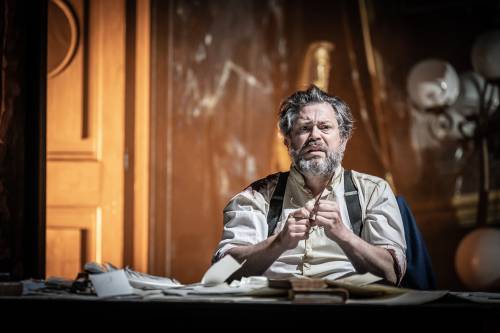
“Charles Edwards’s own sets for his new Tristan und Isolde at Grange Park adorn three spaces (one for each act) referencing the iconography of the Pre-Raphaelite Brotherhood, more or less contemporaneous with Wagner’s opera.”
“Gabrielle Dalton’s stylish, opulent costumes also reference the myth as seen through 19th-century eyes.”
“The skill with which Nicholls develops this character, both vocally and dramatically, can hardly be overstated. Her voice may not have the laser-like projection or sheer fire-power of some of the fondly remembered Isoldes of the past, but her musical intelligence shines through.”
“Neither, mercifully, did Gwyn Hughes Jones shout his way through the part as one so often hears these days on the great stages of the world, not least those that have completely exposed pits such as at Vienna and Leipzig. His enactment of Tristan’s psychic breakdown in Act III was curiously, but not unsuccessfully, interiorised.”


“David Stout’s Kurwenal was sturdily sung and beautifully characterised, while Christine Rice’s eloquent Brangane had considerable authority.”
“Matthew Rose, got up to resemble Otto Wesendonck, his real-life counterpart in the drama playing itself out in and around the Asyl in 1850s Zurich, was in excellent voice as King Mark.”
“The love music of the second act, however, benefited enormously from his [Stephen Barlow] empathy for both score and singers, coaxing from them wonderfully cultivated tone and shapely phrasing. His skill in teasing out the sonorities of individual instruments in an intimately chamber-like manner (the members of the Gascoigne Orchestra responding with enormously sensitive playing) served exceptionally well in the final stages of the last act, which has surely never sounded more exquisite.”


“All credit to Wasfi Kani, the shrewd chatelaine of Grange Park, for assembling this world-class Tristan in a house built from scratch in less than a year, lacking the infrastructure – and budgets – of the international big-hitters. A feat worthy of Wagner himself.”